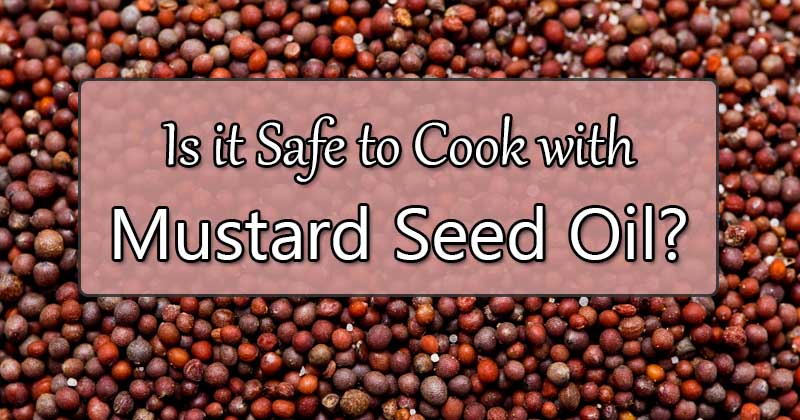Mustard oil accounts for nearly 1/5 of edible oil consumption in India. However, in the West, cooking with mustard oil is very uncommon. In fact, it’s actually illegal to sell most mustard oil for cooking in the USA, Europe and Australia. Here’s why and what you need to know about mustard oil safety.
Why Mustard Oil Must Be Labeled “For External Use Only”
Mustard oil contains a high percentage of erucic acid, a type of fatty acid. Back in the 1950s, some research on animals found that erucic acid caused heart problems. Specifically, erucic acid was linked to myocardial lipidosis, a condition where fat deposits build up in the heart tissue and make heart contractions weaker. Erucic acid also was linked to heart lesions in rats.
As a result of this research, several countries banned mustard oil for cooking in the 90s. You can still find mustard oil sold; it just must bear the warning “For external use only.”
Despite this warning, it is still common for people to use mustard oil for cooking. Even some of the top chefs in America use “external use only” mustard oil in their dishes.
Is Erucic Acid Bad for Humans?
Here is where things get controversial: there is currently no evidence linking erucic acid to health problems in humans. Further, research shows that rats are less able to digest vegetable oils. Humans can digest approximately 99% of erucic acid fats whereas rats only digest about 77%. This could be the reason that animal studies showed negative effects of erucic acid.
There were a couple studies testing the effects of erucic acid on monkeys though. Monkeys were fed diets high in erucic acid. A control group was fed corn oil and lard. Both groups of monkeys had increased fat buildup in the heart but the erucic acid group had more.
How Much Erucic Acid Is Too Much?
In rats, myocardial lipidosis was linked to erucic acid doses of 1500mg per day per 1kg of bodyweight (680mg per 1lb of bodyweight). Mustard oil contains up to 50% erucic acid. So, based on these levels, a 120lb person would have to consume 163,200mg of mustard oil daily to see negative health effects. That’s about 37 tsp. of mustard oil.
However, the European Food Safety Authority has proposed much lower safe levels for erucic acid consumption: 7mg/per day/per kg of bodyweight (3.2mg per 1lb of bodyweight). For a 120lb adult, that breaks down to 768mg of mustard oil per day. That’s a very small amount – just about 1/8 of a teaspoon.
Research Shows Mustard Oil is Good for the Heart
Ironically, there is a lot of research which shows that mustard oil is good for heart health. Studies have found that consuming mustard oil decreases the risk of heart disease by nearly 70%. In North India, where mustard oil is commonly used, rates of heart disease are much lower than in the South. There are also numerous other scientifically-backed health benefits of mustard oil.
Topical Use of Mustard Oil Is Safe
While using mustard oil for cooking may be controversial, it is considered completely safe to use on the skin and hair. Because of its moisturizing, antioxidant and anti-inflammatory properties, you can find mustard oil in many beauty products.
Read: Best Mustard Seed Oil for Skin and Hair
Should You Use Mustard Oil for Cooking?
Until there is more information available, about erucic acid effects in humans, it is impossible to say with certainty whether it is safe to use mustard oil for cooking. It is your decision to take the risk or not.
However, there is one solution: a brand called Yandilla makes a low erucic acid mustard oil. It is currently the only FDA-approved mustard oil for cooking. The oil is cold-pressed from a type of mustard plant that was specially bred to contain very low erucic acid amounts.

